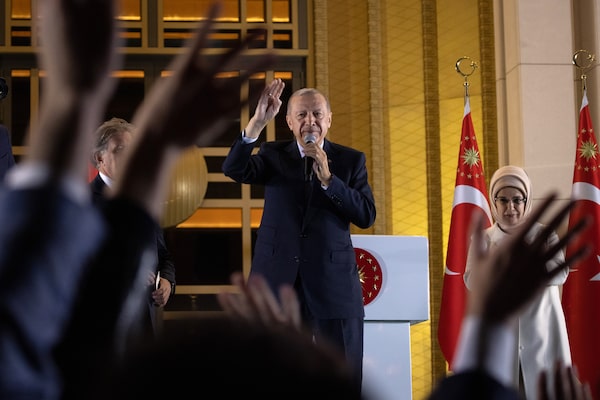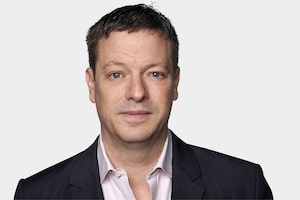
President Recep Tayyip Erdogan speaks to supporters at the presidential palace after winning reelection in a runoff on May 29, in Ankara, Turkey.Chris McGrath/Getty Images
Twenty years after he first came to power on what had been a pro-Europe reformist platform, Turkish President Recep Tayyip Erdogan declared his sixth election victory Sunday night on far angrier and more nationalistic terms.
The second-round result in a tightly contested campaign – officially tallied at 52.1 per cent to 47.9 per cent – came against the most organized opposition Turkey has seen in decades and amid an economy devastated by Mr. Erdogan’s policies. And it has left many Turks wondering if Mr. Erdogan is now poised to be president for life.
Mr. Erdogan’s combative politics were evident in his initial victory speech in Istanbul late Sunday night, in which he offered no olive branches to the opposition parties, instead branding them “pro-LGBT” and declaring that his Justice and Development Party (AKP) would protect the family unit from a Western homosexual onslaught and from the Syrian refugees he had demonized throughout his campaign.
That angry culture-war rhetoric seemed inspired by Russian President Vladimir Putin – as has Mr. Erdogan’s decade of attacking and transforming the courts, the military, the media and the legislature, all of which he has engineered to serve the interests of his leadership and party. Those changes include a 2017 referendum that removed most powers from the legislature (of which he had previously been Prime Minister) and turned Turkey into a presidential state, giving him sweeping executive powers.
The election itself, like the first-round vote on May 14, appeared to be relatively free; the scattering of complaints about ballot interference were likely not enough to affect the outcome.
Instead, opposition leader Kemal Kilicdaroglu suggested, as many other observers have concluded, that Mr. Erdogan has followed the path of other “illiberal democrats,” such as Hungary’s Viktor Orban and Mr. Putin, by allowing superficially free elections while devastating and disempowering the institutions of democracy between elections.
“We have experienced the most unfair election process in recent years,” Mr. Kilicdaroglu told his supporters Sunday night. “All the means of the state were mobilized for one political party and laid at the feet of one man.”
Erdogan election showing cools Turkish turnaround hopes
The opposition coalition of six parties ranging from secularists to far-right nationalists to Islamists, assembled by Mr. Kilicdaroglu, certainly faced a daunting challenge in a country whose institutions are mostly now directly controlled by Mr. Erdogan’s AKP.
That includes the media. During the 2010s, scores of editors and journalists were jailed or banished by Mr. Erdogan, and their newspapers and broadcasters shut down or put under state control.
As a consequence, according to Turkish journalist Amberin Zaman, Mr. Erdogan got 32 hours of airtime on state TV during April, while Mr. Kilicdaroglu got only 32 minutes.
That control, combined with the genuine popularity Mr. Erdogan holds among many sectors of the Turkish population, meant that his electoral success was virtually impervious to the most serious criticisms the economy could deliver.
And those were formidable. Turkey is in the midst of an economic collapse, with levels of inflation and currency devaluation far worse than those experienced in other developed countries during the months after the worst of the pandemic; much of the devastation has been blamed on Mr. Erdogan’s unorthodox monetary policies.
Mr. Erdogan has also faced unanswerable criticism for the terrible February earthquake, which killed more than 50,000 and saw hundreds of recently built high-rise apartments collapse. This was shown to be the result of a loosening of building standards under AKP governments that had close ties to the construction industry.
Those controversies received much less attention during the election campaign than many observers had expected. Instead, both Mr. Erdogan and his opposition seemed singularly fixated on the issue of Syrian refugees. Since the Syrian uprising turned into a civil war in 2011, more than 3.7 million Syrians have settled in Turkey; only about 200,000 have become Turkish citizens.
Mr. Erdogan began his campaign vowing to expel a million Syrians. Mr. Kilicdaroglu went further, promising to banish all of them and to make peace with Syrian dictator Bashar al-Assad, whose chemical-warfare attacks against his people have been described as genocidal. Indeed, one of the most prevalent campaign posters for Mr. Kilicdaroglu’s coalition showed his photo below the stark red words “Syrians Will Leave.”
Mr. Kilicdaroglu and his coalition partners vowed to devote their campaigns to countering Mr. Erdogan’s swing into authoritarianism – and they did promise to restore democratic institutions and parliamentary democracy. However, they appear to have decided to appeal to the President’s voters by mimicking and sometimes exceeding his xenophobic messages, in what may have been a fatal mistake.
That included hostile messages directed at Kurds, who make up about a fifth of Turkey’s population. In previous elections, Mr. Kilicdaroglu’s secularist Republican People’s Party (CHP) has campaigned alongside the major Kurdish party, the People’s Democratic Party (HDP). In this election, the HDP was outside of the coalition, which echoed many of Mr. Erdogan’s messages denouncing Kurdish activists as terrorists and enemies.
As a consequence, voter turnout, while quite high nationally, was unusually low in Turkey’s Kurdish-majority regions, suggesting that many Kurds, discouraged by the bipartisan hostility toward their people, stayed home on Sunday. This, in the end, may have been enough to seal Mr. Erdogan’s victory.
 Doug Saunders
Doug Saunders